Assessment 2: Essay on Authentic Leadership, LMX, and PsyCap at Uni
VerifiedAdded on 2022/09/27
|11
|3030
|22
Essay
AI Summary
This essay provides a comprehensive analysis of authentic leadership, its relationship with Leader-Member Exchange (LMX), and the psychological capital (PsyCap) of employees within an organizational context. It delves into the importance of authentic leadership in fostering a positive ethical climate and enhancing employees' psychological capacities, as supported by various academic sources. The essay explores how effective LMX and management support contribute to employee development and productivity. Furthermore, it examines the application of PsyCap across different employee groups, including professionals, administrative staff, blue-collar, and white-collar workers, as well as generational and ethnic differences. The study highlights how authentic leadership can improve psychological capital by inspiring employees to develop similar qualities as the leader through emotional connectivity. The essay concludes by emphasizing the interconnectedness of authentic leadership, LMX, and PsyCap, highlighting their combined effect on organizational growth and success, with positive impacts irrespective of the organization's nature and dimensions.
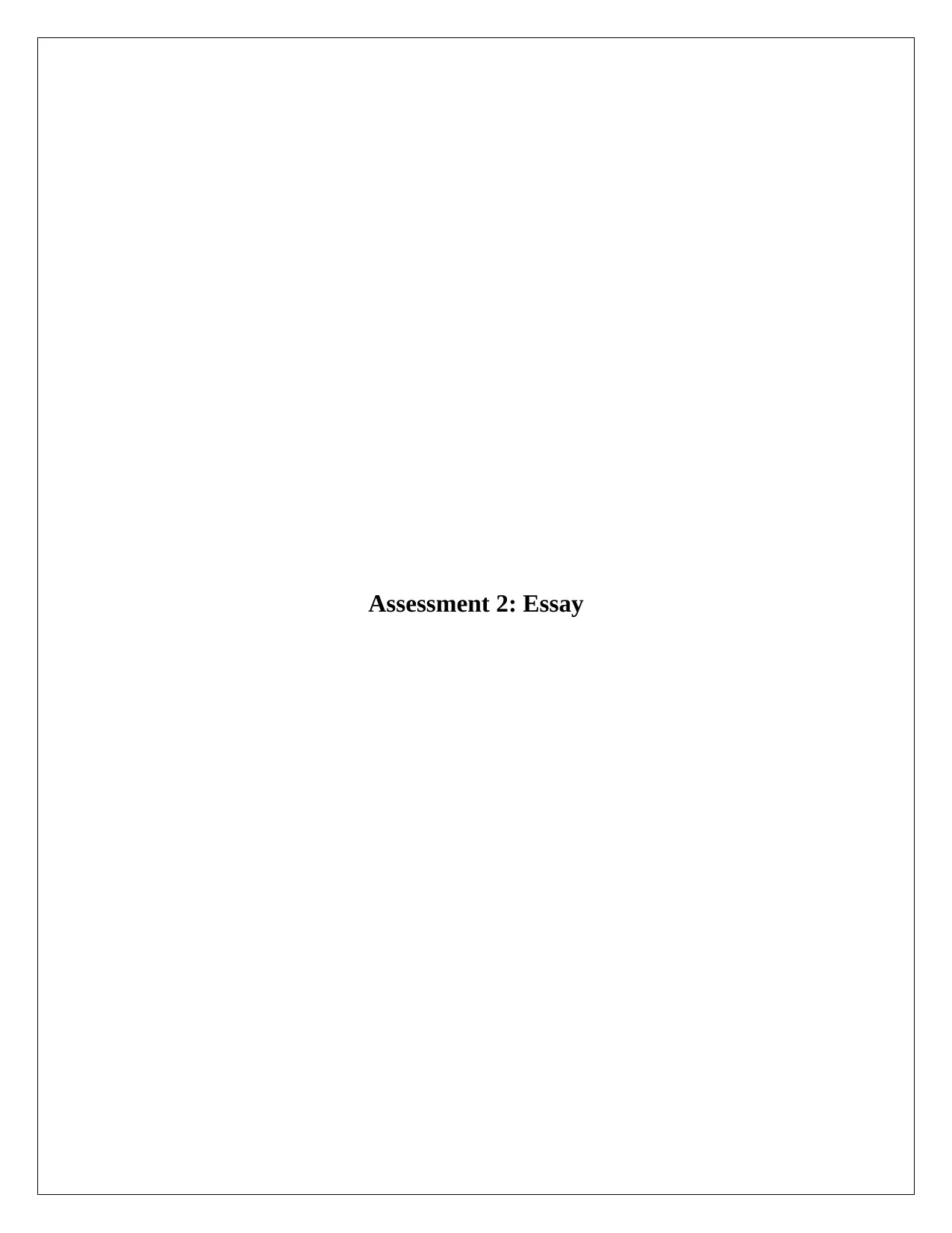
Assessment 2: Essay
Paraphrase This Document
Need a fresh take? Get an instant paraphrase of this document with our AI Paraphraser
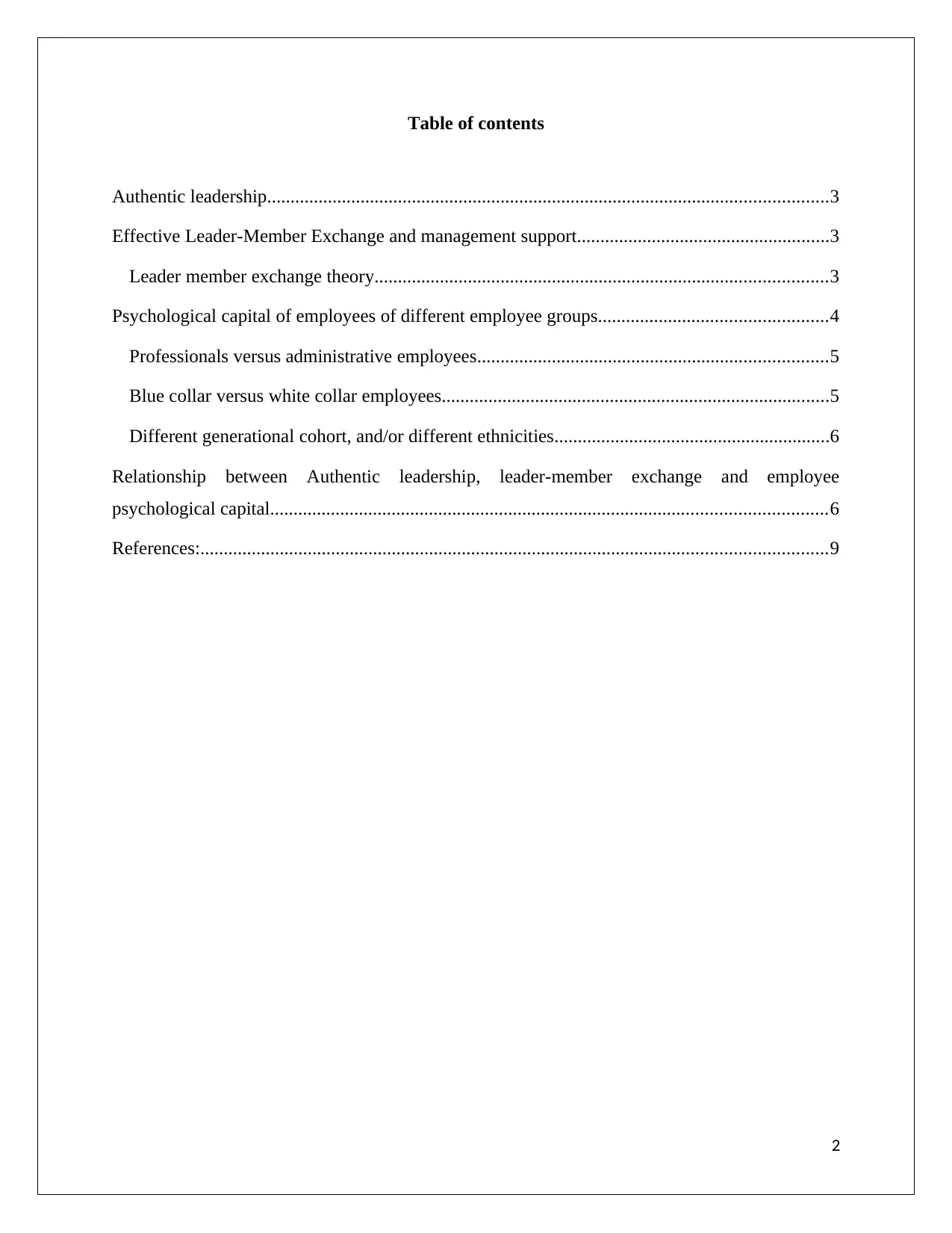
Table of contents
Authentic leadership........................................................................................................................3
Effective Leader-Member Exchange and management support......................................................3
Leader member exchange theory.................................................................................................3
Psychological capital of employees of different employee groups.................................................4
Professionals versus administrative employees...........................................................................5
Blue collar versus white collar employees...................................................................................5
Different generational cohort, and/or different ethnicities...........................................................6
Relationship between Authentic leadership, leader-member exchange and employee
psychological capital.......................................................................................................................6
References:......................................................................................................................................9
2
Authentic leadership........................................................................................................................3
Effective Leader-Member Exchange and management support......................................................3
Leader member exchange theory.................................................................................................3
Psychological capital of employees of different employee groups.................................................4
Professionals versus administrative employees...........................................................................5
Blue collar versus white collar employees...................................................................................5
Different generational cohort, and/or different ethnicities...........................................................6
Relationship between Authentic leadership, leader-member exchange and employee
psychological capital.......................................................................................................................6
References:......................................................................................................................................9
2
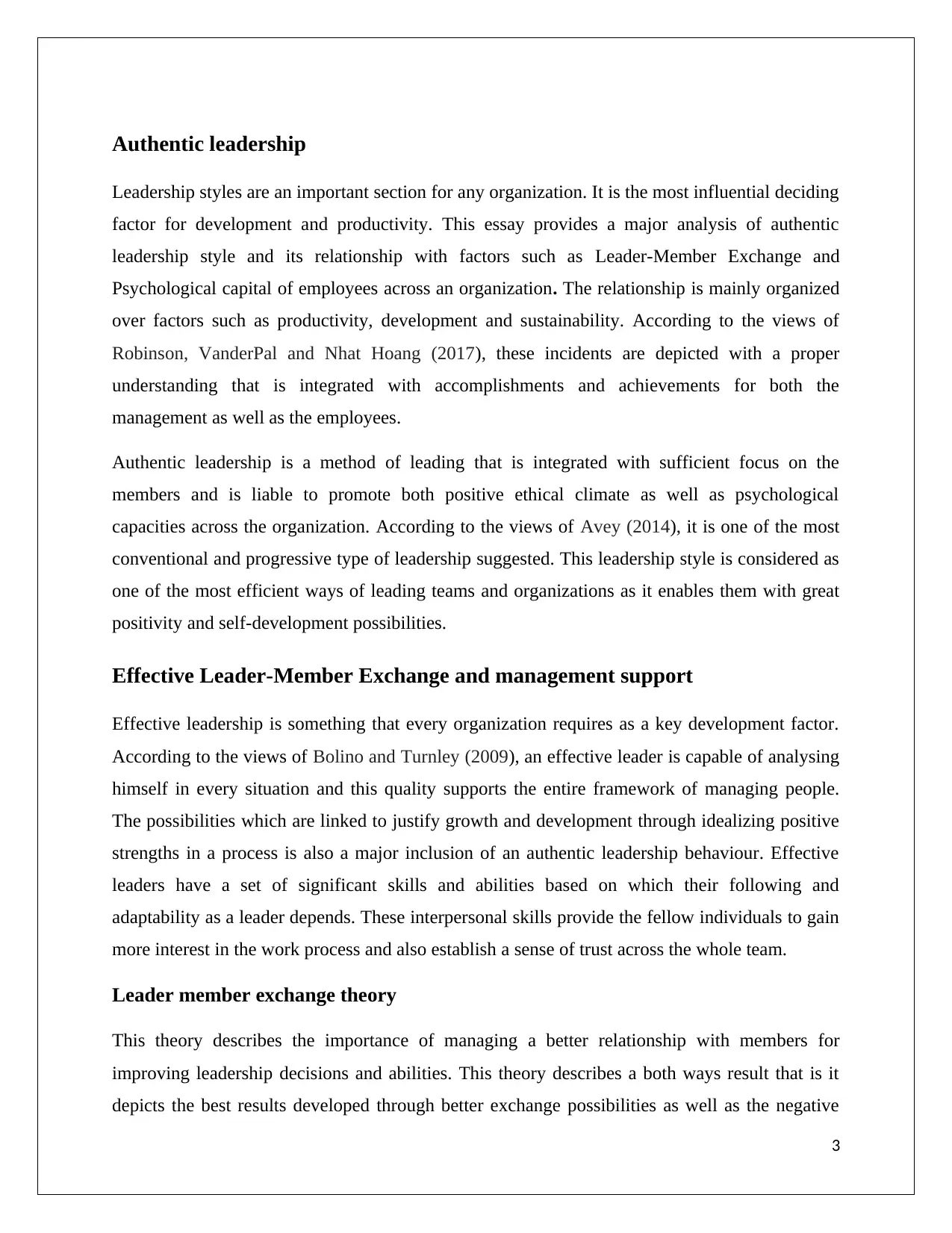
Authentic leadership
Leadership styles are an important section for any organization. It is the most influential deciding
factor for development and productivity. This essay provides a major analysis of authentic
leadership style and its relationship with factors such as Leader-Member Exchange and
Psychological capital of employees across an organization. The relationship is mainly organized
over factors such as productivity, development and sustainability. According to the views of
Robinson, VanderPal and Nhat Hoang (2017), these incidents are depicted with a proper
understanding that is integrated with accomplishments and achievements for both the
management as well as the employees.
Authentic leadership is a method of leading that is integrated with sufficient focus on the
members and is liable to promote both positive ethical climate as well as psychological
capacities across the organization. According to the views of Avey (2014), it is one of the most
conventional and progressive type of leadership suggested. This leadership style is considered as
one of the most efficient ways of leading teams and organizations as it enables them with great
positivity and self-development possibilities.
Effective Leader-Member Exchange and management support
Effective leadership is something that every organization requires as a key development factor.
According to the views of Bolino and Turnley (2009), an effective leader is capable of analysing
himself in every situation and this quality supports the entire framework of managing people.
The possibilities which are linked to justify growth and development through idealizing positive
strengths in a process is also a major inclusion of an authentic leadership behaviour. Effective
leaders have a set of significant skills and abilities based on which their following and
adaptability as a leader depends. These interpersonal skills provide the fellow individuals to gain
more interest in the work process and also establish a sense of trust across the whole team.
Leader member exchange theory
This theory describes the importance of managing a better relationship with members for
improving leadership decisions and abilities. This theory describes a both ways result that is it
depicts the best results developed through better exchange possibilities as well as the negative
3
Leadership styles are an important section for any organization. It is the most influential deciding
factor for development and productivity. This essay provides a major analysis of authentic
leadership style and its relationship with factors such as Leader-Member Exchange and
Psychological capital of employees across an organization. The relationship is mainly organized
over factors such as productivity, development and sustainability. According to the views of
Robinson, VanderPal and Nhat Hoang (2017), these incidents are depicted with a proper
understanding that is integrated with accomplishments and achievements for both the
management as well as the employees.
Authentic leadership is a method of leading that is integrated with sufficient focus on the
members and is liable to promote both positive ethical climate as well as psychological
capacities across the organization. According to the views of Avey (2014), it is one of the most
conventional and progressive type of leadership suggested. This leadership style is considered as
one of the most efficient ways of leading teams and organizations as it enables them with great
positivity and self-development possibilities.
Effective Leader-Member Exchange and management support
Effective leadership is something that every organization requires as a key development factor.
According to the views of Bolino and Turnley (2009), an effective leader is capable of analysing
himself in every situation and this quality supports the entire framework of managing people.
The possibilities which are linked to justify growth and development through idealizing positive
strengths in a process is also a major inclusion of an authentic leadership behaviour. Effective
leaders have a set of significant skills and abilities based on which their following and
adaptability as a leader depends. These interpersonal skills provide the fellow individuals to gain
more interest in the work process and also establish a sense of trust across the whole team.
Leader member exchange theory
This theory describes the importance of managing a better relationship with members for
improving leadership decisions and abilities. This theory describes a both ways result that is it
depicts the best results developed through better exchange possibilities as well as the negative
3
⊘ This is a preview!⊘
Do you want full access?
Subscribe today to unlock all pages.

Trusted by 1+ million students worldwide
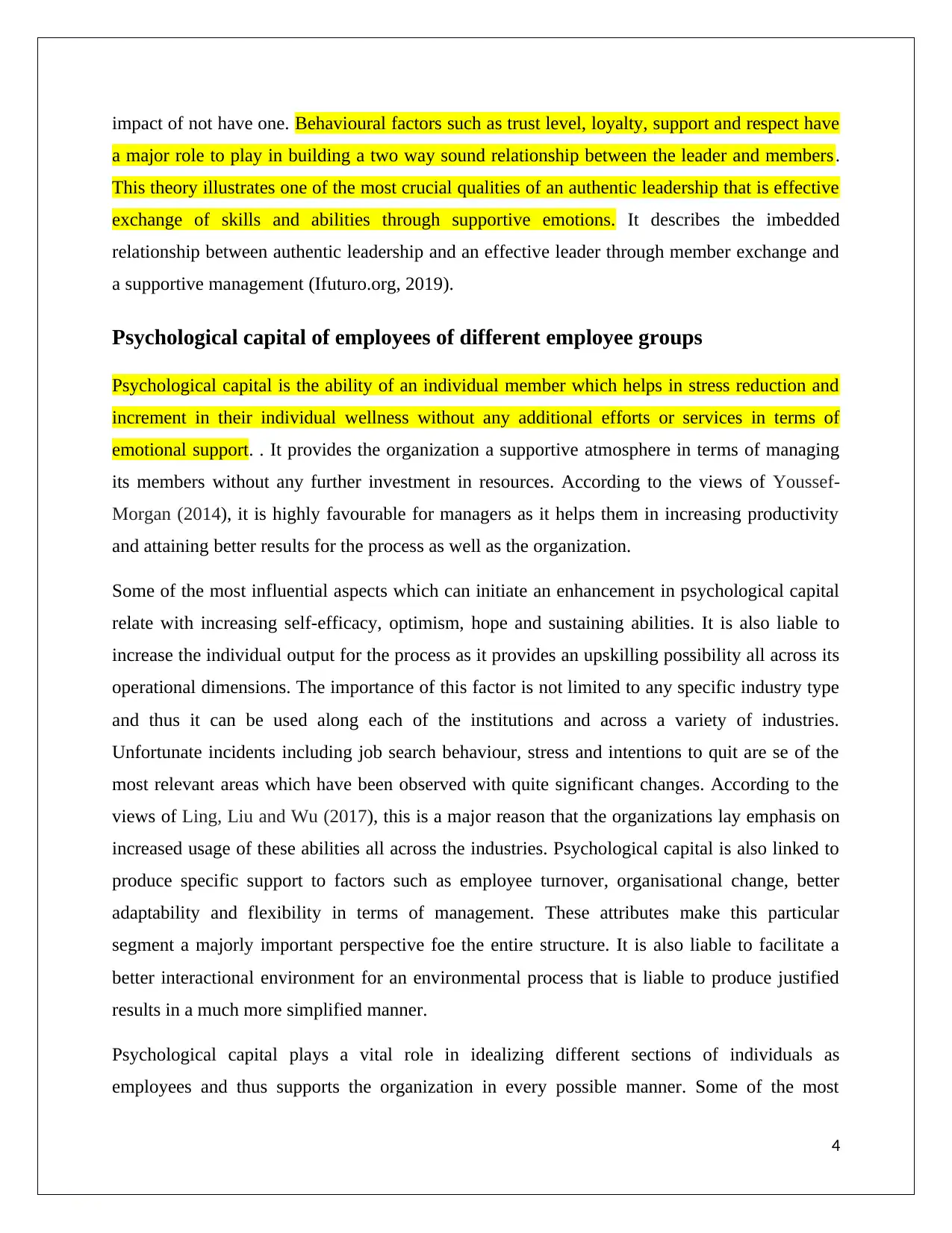
impact of not have one. Behavioural factors such as trust level, loyalty, support and respect have
a major role to play in building a two way sound relationship between the leader and members.
This theory illustrates one of the most crucial qualities of an authentic leadership that is effective
exchange of skills and abilities through supportive emotions. It describes the imbedded
relationship between authentic leadership and an effective leader through member exchange and
a supportive management (Ifuturo.org, 2019).
Psychological capital of employees of different employee groups
Psychological capital is the ability of an individual member which helps in stress reduction and
increment in their individual wellness without any additional efforts or services in terms of
emotional support. . It provides the organization a supportive atmosphere in terms of managing
its members without any further investment in resources. According to the views of Youssef-
Morgan (2014), it is highly favourable for managers as it helps them in increasing productivity
and attaining better results for the process as well as the organization.
Some of the most influential aspects which can initiate an enhancement in psychological capital
relate with increasing self-efficacy, optimism, hope and sustaining abilities. It is also liable to
increase the individual output for the process as it provides an upskilling possibility all across its
operational dimensions. The importance of this factor is not limited to any specific industry type
and thus it can be used along each of the institutions and across a variety of industries.
Unfortunate incidents including job search behaviour, stress and intentions to quit are se of the
most relevant areas which have been observed with quite significant changes. According to the
views of Ling, Liu and Wu (2017), this is a major reason that the organizations lay emphasis on
increased usage of these abilities all across the industries. Psychological capital is also linked to
produce specific support to factors such as employee turnover, organisational change, better
adaptability and flexibility in terms of management. These attributes make this particular
segment a majorly important perspective foe the entire structure. It is also liable to facilitate a
better interactional environment for an environmental process that is liable to produce justified
results in a much more simplified manner.
Psychological capital plays a vital role in idealizing different sections of individuals as
employees and thus supports the organization in every possible manner. Some of the most
4
a major role to play in building a two way sound relationship between the leader and members.
This theory illustrates one of the most crucial qualities of an authentic leadership that is effective
exchange of skills and abilities through supportive emotions. It describes the imbedded
relationship between authentic leadership and an effective leader through member exchange and
a supportive management (Ifuturo.org, 2019).
Psychological capital of employees of different employee groups
Psychological capital is the ability of an individual member which helps in stress reduction and
increment in their individual wellness without any additional efforts or services in terms of
emotional support. . It provides the organization a supportive atmosphere in terms of managing
its members without any further investment in resources. According to the views of Youssef-
Morgan (2014), it is highly favourable for managers as it helps them in increasing productivity
and attaining better results for the process as well as the organization.
Some of the most influential aspects which can initiate an enhancement in psychological capital
relate with increasing self-efficacy, optimism, hope and sustaining abilities. It is also liable to
increase the individual output for the process as it provides an upskilling possibility all across its
operational dimensions. The importance of this factor is not limited to any specific industry type
and thus it can be used along each of the institutions and across a variety of industries.
Unfortunate incidents including job search behaviour, stress and intentions to quit are se of the
most relevant areas which have been observed with quite significant changes. According to the
views of Ling, Liu and Wu (2017), this is a major reason that the organizations lay emphasis on
increased usage of these abilities all across the industries. Psychological capital is also linked to
produce specific support to factors such as employee turnover, organisational change, better
adaptability and flexibility in terms of management. These attributes make this particular
segment a majorly important perspective foe the entire structure. It is also liable to facilitate a
better interactional environment for an environmental process that is liable to produce justified
results in a much more simplified manner.
Psychological capital plays a vital role in idealizing different sections of individuals as
employees and thus supports the organization in every possible manner. Some of the most
4
Paraphrase This Document
Need a fresh take? Get an instant paraphrase of this document with our AI Paraphraser
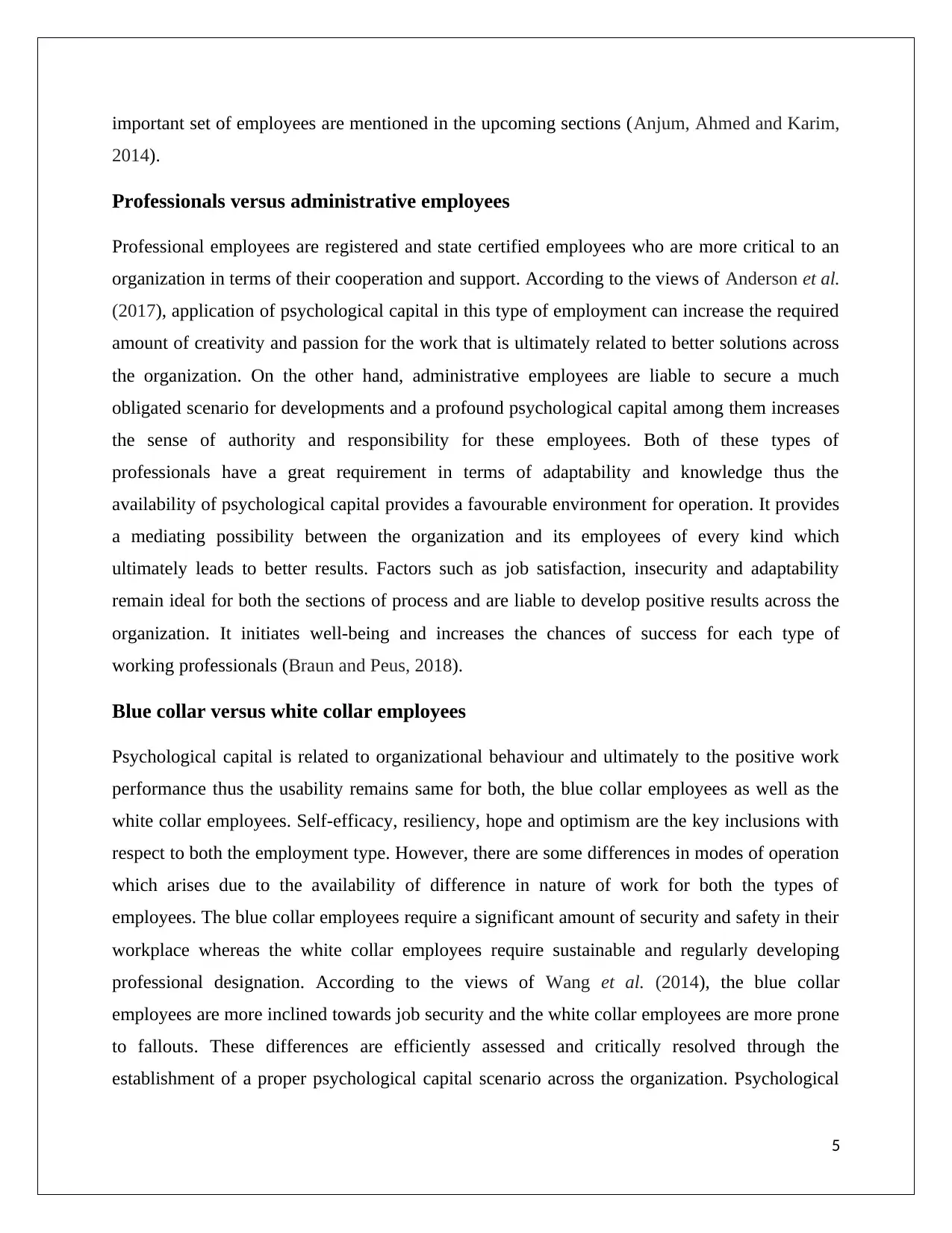
important set of employees are mentioned in the upcoming sections (Anjum, Ahmed and Karim,
2014).
Professionals versus administrative employees
Professional employees are registered and state certified employees who are more critical to an
organization in terms of their cooperation and support. According to the views of Anderson et al.
(2017), application of psychological capital in this type of employment can increase the required
amount of creativity and passion for the work that is ultimately related to better solutions across
the organization. On the other hand, administrative employees are liable to secure a much
obligated scenario for developments and a profound psychological capital among them increases
the sense of authority and responsibility for these employees. Both of these types of
professionals have a great requirement in terms of adaptability and knowledge thus the
availability of psychological capital provides a favourable environment for operation. It provides
a mediating possibility between the organization and its employees of every kind which
ultimately leads to better results. Factors such as job satisfaction, insecurity and adaptability
remain ideal for both the sections of process and are liable to develop positive results across the
organization. It initiates well-being and increases the chances of success for each type of
working professionals (Braun and Peus, 2018).
Blue collar versus white collar employees
Psychological capital is related to organizational behaviour and ultimately to the positive work
performance thus the usability remains same for both, the blue collar employees as well as the
white collar employees. Self-efficacy, resiliency, hope and optimism are the key inclusions with
respect to both the employment type. However, there are some differences in modes of operation
which arises due to the availability of difference in nature of work for both the types of
employees. The blue collar employees require a significant amount of security and safety in their
workplace whereas the white collar employees require sustainable and regularly developing
professional designation. According to the views of Wang et al. (2014), the blue collar
employees are more inclined towards job security and the white collar employees are more prone
to fallouts. These differences are efficiently assessed and critically resolved through the
establishment of a proper psychological capital scenario across the organization. Psychological
5
2014).
Professionals versus administrative employees
Professional employees are registered and state certified employees who are more critical to an
organization in terms of their cooperation and support. According to the views of Anderson et al.
(2017), application of psychological capital in this type of employment can increase the required
amount of creativity and passion for the work that is ultimately related to better solutions across
the organization. On the other hand, administrative employees are liable to secure a much
obligated scenario for developments and a profound psychological capital among them increases
the sense of authority and responsibility for these employees. Both of these types of
professionals have a great requirement in terms of adaptability and knowledge thus the
availability of psychological capital provides a favourable environment for operation. It provides
a mediating possibility between the organization and its employees of every kind which
ultimately leads to better results. Factors such as job satisfaction, insecurity and adaptability
remain ideal for both the sections of process and are liable to develop positive results across the
organization. It initiates well-being and increases the chances of success for each type of
working professionals (Braun and Peus, 2018).
Blue collar versus white collar employees
Psychological capital is related to organizational behaviour and ultimately to the positive work
performance thus the usability remains same for both, the blue collar employees as well as the
white collar employees. Self-efficacy, resiliency, hope and optimism are the key inclusions with
respect to both the employment type. However, there are some differences in modes of operation
which arises due to the availability of difference in nature of work for both the types of
employees. The blue collar employees require a significant amount of security and safety in their
workplace whereas the white collar employees require sustainable and regularly developing
professional designation. According to the views of Wang et al. (2014), the blue collar
employees are more inclined towards job security and the white collar employees are more prone
to fallouts. These differences are efficiently assessed and critically resolved through the
establishment of a proper psychological capital scenario across the organization. Psychological
5
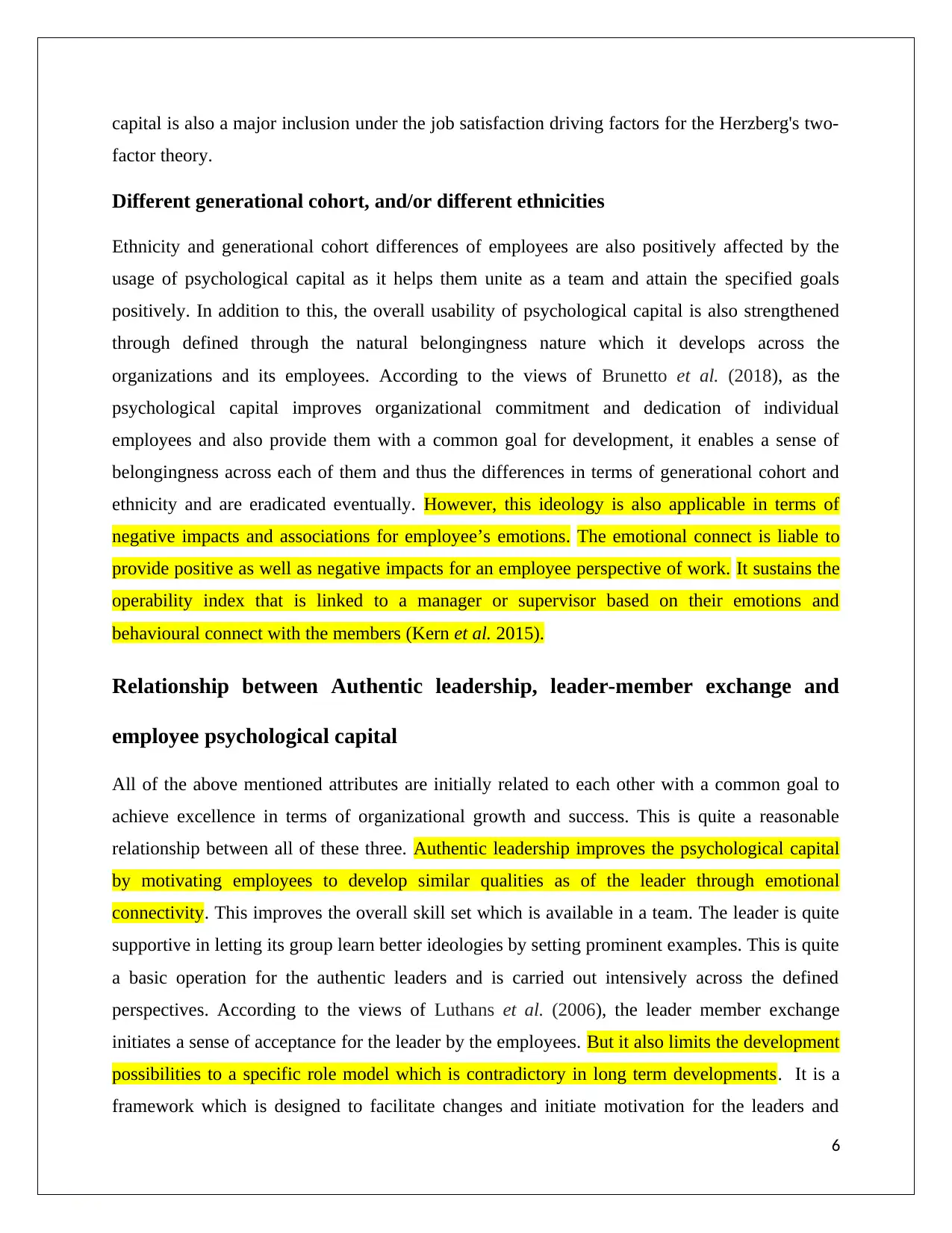
capital is also a major inclusion under the job satisfaction driving factors for the Herzberg's two-
factor theory.
Different generational cohort, and/or different ethnicities
Ethnicity and generational cohort differences of employees are also positively affected by the
usage of psychological capital as it helps them unite as a team and attain the specified goals
positively. In addition to this, the overall usability of psychological capital is also strengthened
through defined through the natural belongingness nature which it develops across the
organizations and its employees. According to the views of Brunetto et al. (2018), as the
psychological capital improves organizational commitment and dedication of individual
employees and also provide them with a common goal for development, it enables a sense of
belongingness across each of them and thus the differences in terms of generational cohort and
ethnicity and are eradicated eventually. However, this ideology is also applicable in terms of
negative impacts and associations for employee’s emotions. The emotional connect is liable to
provide positive as well as negative impacts for an employee perspective of work. It sustains the
operability index that is linked to a manager or supervisor based on their emotions and
behavioural connect with the members (Kern et al. 2015).
Relationship between Authentic leadership, leader-member exchange and
employee psychological capital
All of the above mentioned attributes are initially related to each other with a common goal to
achieve excellence in terms of organizational growth and success. This is quite a reasonable
relationship between all of these three. Authentic leadership improves the psychological capital
by motivating employees to develop similar qualities as of the leader through emotional
connectivity. This improves the overall skill set which is available in a team. The leader is quite
supportive in letting its group learn better ideologies by setting prominent examples. This is quite
a basic operation for the authentic leaders and is carried out intensively across the defined
perspectives. According to the views of Luthans et al. (2006), the leader member exchange
initiates a sense of acceptance for the leader by the employees. But it also limits the development
possibilities to a specific role model which is contradictory in long term developments. It is a
framework which is designed to facilitate changes and initiate motivation for the leaders and
6
factor theory.
Different generational cohort, and/or different ethnicities
Ethnicity and generational cohort differences of employees are also positively affected by the
usage of psychological capital as it helps them unite as a team and attain the specified goals
positively. In addition to this, the overall usability of psychological capital is also strengthened
through defined through the natural belongingness nature which it develops across the
organizations and its employees. According to the views of Brunetto et al. (2018), as the
psychological capital improves organizational commitment and dedication of individual
employees and also provide them with a common goal for development, it enables a sense of
belongingness across each of them and thus the differences in terms of generational cohort and
ethnicity and are eradicated eventually. However, this ideology is also applicable in terms of
negative impacts and associations for employee’s emotions. The emotional connect is liable to
provide positive as well as negative impacts for an employee perspective of work. It sustains the
operability index that is linked to a manager or supervisor based on their emotions and
behavioural connect with the members (Kern et al. 2015).
Relationship between Authentic leadership, leader-member exchange and
employee psychological capital
All of the above mentioned attributes are initially related to each other with a common goal to
achieve excellence in terms of organizational growth and success. This is quite a reasonable
relationship between all of these three. Authentic leadership improves the psychological capital
by motivating employees to develop similar qualities as of the leader through emotional
connectivity. This improves the overall skill set which is available in a team. The leader is quite
supportive in letting its group learn better ideologies by setting prominent examples. This is quite
a basic operation for the authentic leaders and is carried out intensively across the defined
perspectives. According to the views of Luthans et al. (2006), the leader member exchange
initiates a sense of acceptance for the leader by the employees. But it also limits the development
possibilities to a specific role model which is contradictory in long term developments. It is a
framework which is designed to facilitate changes and initiate motivation for the leaders and
6
⊘ This is a preview!⊘
Do you want full access?
Subscribe today to unlock all pages.

Trusted by 1+ million students worldwide
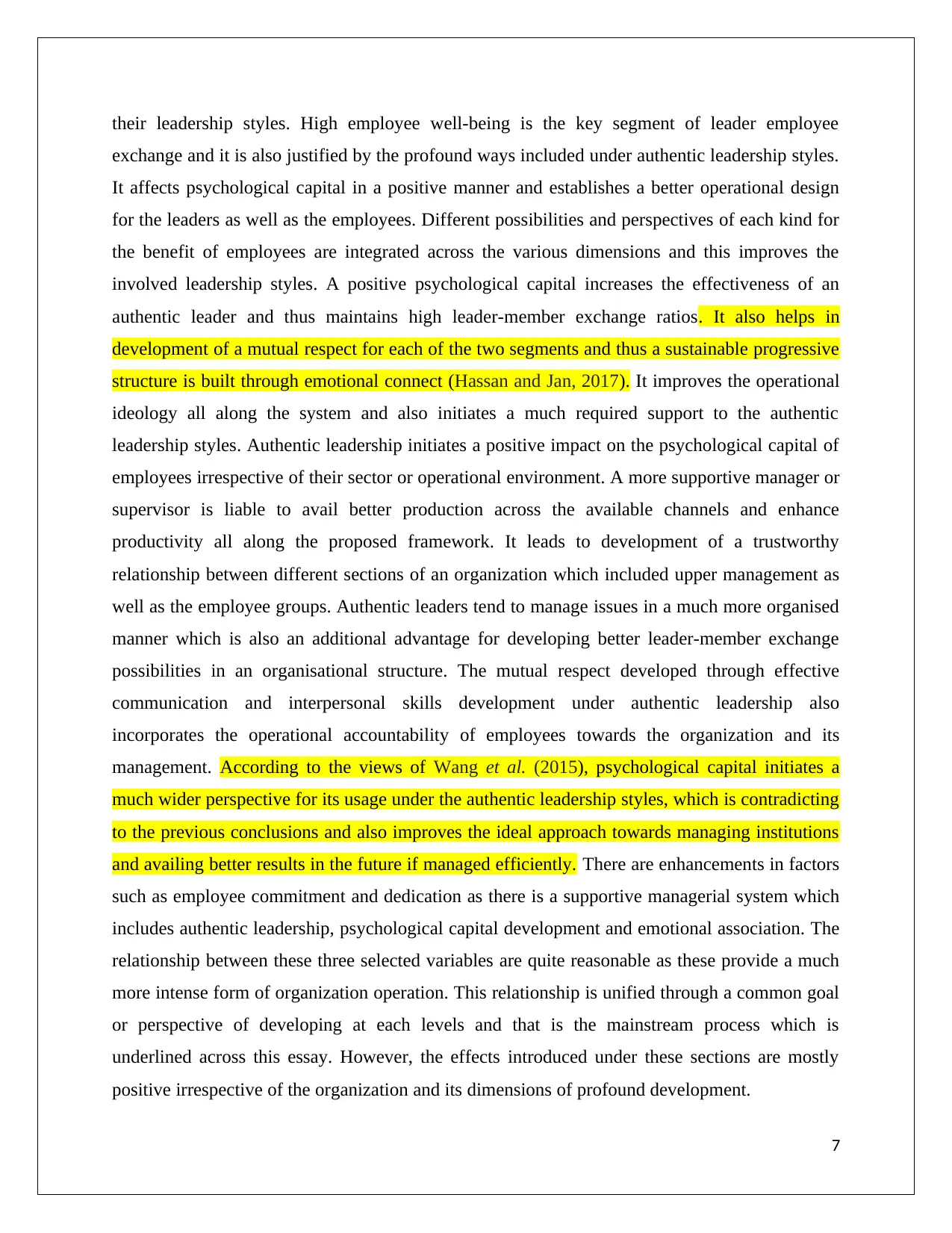
their leadership styles. High employee well-being is the key segment of leader employee
exchange and it is also justified by the profound ways included under authentic leadership styles.
It affects psychological capital in a positive manner and establishes a better operational design
for the leaders as well as the employees. Different possibilities and perspectives of each kind for
the benefit of employees are integrated across the various dimensions and this improves the
involved leadership styles. A positive psychological capital increases the effectiveness of an
authentic leader and thus maintains high leader-member exchange ratios. It also helps in
development of a mutual respect for each of the two segments and thus a sustainable progressive
structure is built through emotional connect (Hassan and Jan, 2017). It improves the operational
ideology all along the system and also initiates a much required support to the authentic
leadership styles. Authentic leadership initiates a positive impact on the psychological capital of
employees irrespective of their sector or operational environment. A more supportive manager or
supervisor is liable to avail better production across the available channels and enhance
productivity all along the proposed framework. It leads to development of a trustworthy
relationship between different sections of an organization which included upper management as
well as the employee groups. Authentic leaders tend to manage issues in a much more organised
manner which is also an additional advantage for developing better leader-member exchange
possibilities in an organisational structure. The mutual respect developed through effective
communication and interpersonal skills development under authentic leadership also
incorporates the operational accountability of employees towards the organization and its
management. According to the views of Wang et al. (2015), psychological capital initiates a
much wider perspective for its usage under the authentic leadership styles, which is contradicting
to the previous conclusions and also improves the ideal approach towards managing institutions
and availing better results in the future if managed efficiently. There are enhancements in factors
such as employee commitment and dedication as there is a supportive managerial system which
includes authentic leadership, psychological capital development and emotional association. The
relationship between these three selected variables are quite reasonable as these provide a much
more intense form of organization operation. This relationship is unified through a common goal
or perspective of developing at each levels and that is the mainstream process which is
underlined across this essay. However, the effects introduced under these sections are mostly
positive irrespective of the organization and its dimensions of profound development.
7
exchange and it is also justified by the profound ways included under authentic leadership styles.
It affects psychological capital in a positive manner and establishes a better operational design
for the leaders as well as the employees. Different possibilities and perspectives of each kind for
the benefit of employees are integrated across the various dimensions and this improves the
involved leadership styles. A positive psychological capital increases the effectiveness of an
authentic leader and thus maintains high leader-member exchange ratios. It also helps in
development of a mutual respect for each of the two segments and thus a sustainable progressive
structure is built through emotional connect (Hassan and Jan, 2017). It improves the operational
ideology all along the system and also initiates a much required support to the authentic
leadership styles. Authentic leadership initiates a positive impact on the psychological capital of
employees irrespective of their sector or operational environment. A more supportive manager or
supervisor is liable to avail better production across the available channels and enhance
productivity all along the proposed framework. It leads to development of a trustworthy
relationship between different sections of an organization which included upper management as
well as the employee groups. Authentic leaders tend to manage issues in a much more organised
manner which is also an additional advantage for developing better leader-member exchange
possibilities in an organisational structure. The mutual respect developed through effective
communication and interpersonal skills development under authentic leadership also
incorporates the operational accountability of employees towards the organization and its
management. According to the views of Wang et al. (2015), psychological capital initiates a
much wider perspective for its usage under the authentic leadership styles, which is contradicting
to the previous conclusions and also improves the ideal approach towards managing institutions
and availing better results in the future if managed efficiently. There are enhancements in factors
such as employee commitment and dedication as there is a supportive managerial system which
includes authentic leadership, psychological capital development and emotional association. The
relationship between these three selected variables are quite reasonable as these provide a much
more intense form of organization operation. This relationship is unified through a common goal
or perspective of developing at each levels and that is the mainstream process which is
underlined across this essay. However, the effects introduced under these sections are mostly
positive irrespective of the organization and its dimensions of profound development.
7
Paraphrase This Document
Need a fresh take? Get an instant paraphrase of this document with our AI Paraphraser
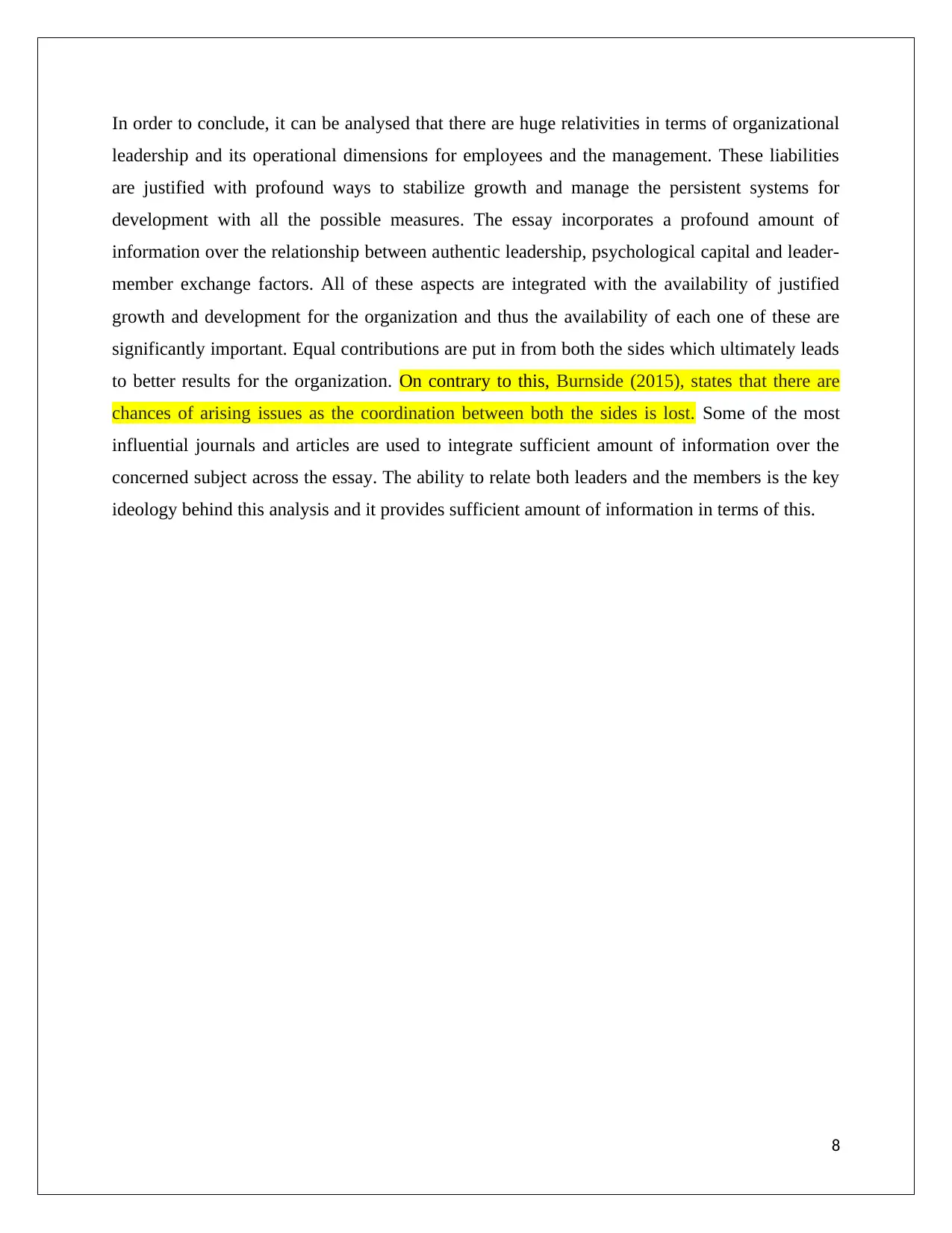
In order to conclude, it can be analysed that there are huge relativities in terms of organizational
leadership and its operational dimensions for employees and the management. These liabilities
are justified with profound ways to stabilize growth and manage the persistent systems for
development with all the possible measures. The essay incorporates a profound amount of
information over the relationship between authentic leadership, psychological capital and leader-
member exchange factors. All of these aspects are integrated with the availability of justified
growth and development for the organization and thus the availability of each one of these are
significantly important. Equal contributions are put in from both the sides which ultimately leads
to better results for the organization. On contrary to this, Burnside (2015), states that there are
chances of arising issues as the coordination between both the sides is lost. Some of the most
influential journals and articles are used to integrate sufficient amount of information over the
concerned subject across the essay. The ability to relate both leaders and the members is the key
ideology behind this analysis and it provides sufficient amount of information in terms of this.
8
leadership and its operational dimensions for employees and the management. These liabilities
are justified with profound ways to stabilize growth and manage the persistent systems for
development with all the possible measures. The essay incorporates a profound amount of
information over the relationship between authentic leadership, psychological capital and leader-
member exchange factors. All of these aspects are integrated with the availability of justified
growth and development for the organization and thus the availability of each one of these are
significantly important. Equal contributions are put in from both the sides which ultimately leads
to better results for the organization. On contrary to this, Burnside (2015), states that there are
chances of arising issues as the coordination between both the sides is lost. Some of the most
influential journals and articles are used to integrate sufficient amount of information over the
concerned subject across the essay. The ability to relate both leaders and the members is the key
ideology behind this analysis and it provides sufficient amount of information in terms of this.
8
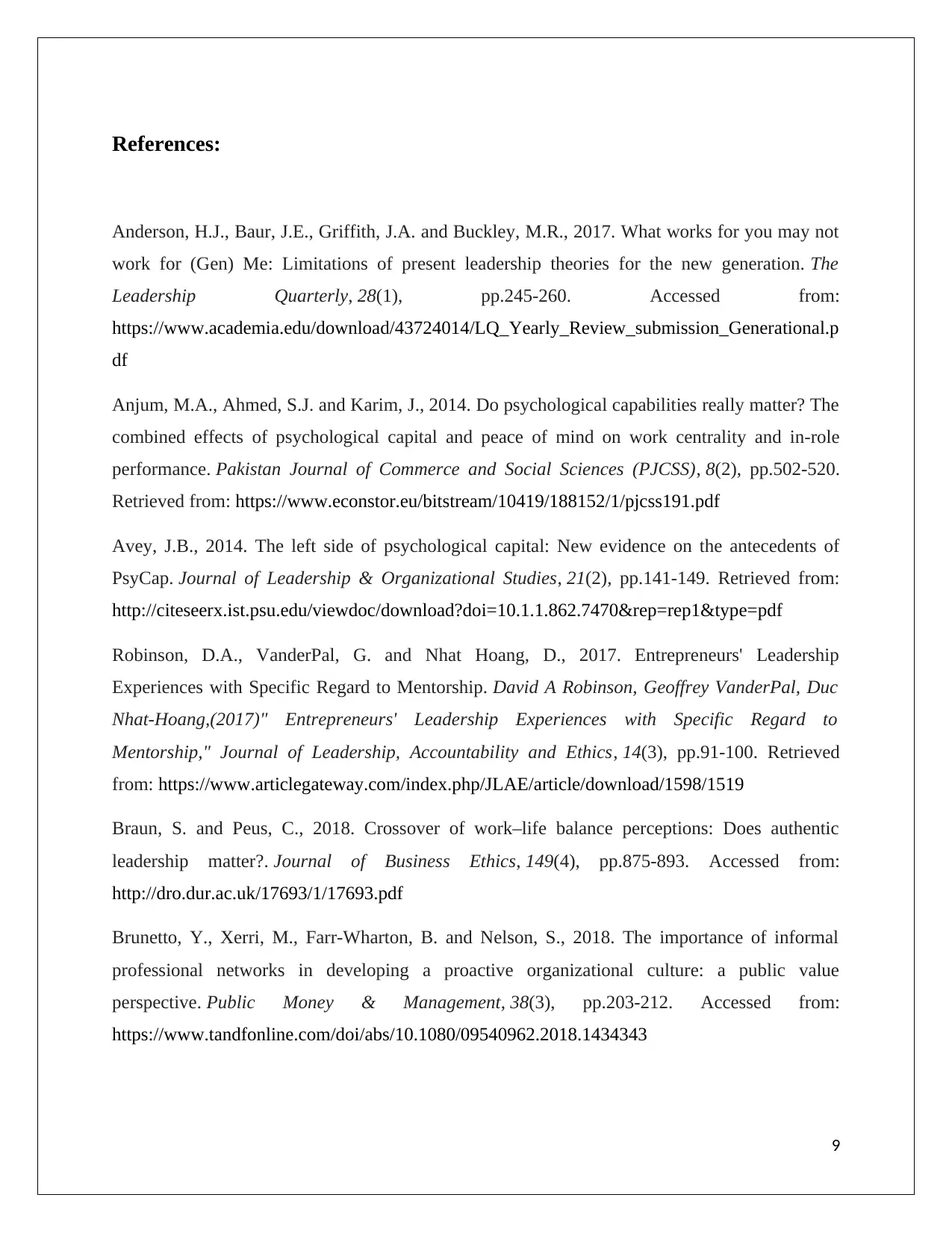
References:
Anderson, H.J., Baur, J.E., Griffith, J.A. and Buckley, M.R., 2017. What works for you may not
work for (Gen) Me: Limitations of present leadership theories for the new generation. The
Leadership Quarterly, 28(1), pp.245-260. Accessed from:
https://www.academia.edu/download/43724014/LQ_Yearly_Review_submission_Generational.p
df
Anjum, M.A., Ahmed, S.J. and Karim, J., 2014. Do psychological capabilities really matter? The
combined effects of psychological capital and peace of mind on work centrality and in-role
performance. Pakistan Journal of Commerce and Social Sciences (PJCSS), 8(2), pp.502-520.
Retrieved from: https://www.econstor.eu/bitstream/10419/188152/1/pjcss191.pdf
Avey, J.B., 2014. The left side of psychological capital: New evidence on the antecedents of
PsyCap. Journal of Leadership & Organizational Studies, 21(2), pp.141-149. Retrieved from:
http://citeseerx.ist.psu.edu/viewdoc/download?doi=10.1.1.862.7470&rep=rep1&type=pdf
Robinson, D.A., VanderPal, G. and Nhat Hoang, D., 2017. Entrepreneurs' Leadership
Experiences with Specific Regard to Mentorship. David A Robinson, Geoffrey VanderPal, Duc
Nhat-Hoang,(2017)" Entrepreneurs' Leadership Experiences with Specific Regard to
Mentorship," Journal of Leadership, Accountability and Ethics, 14(3), pp.91-100. Retrieved
from: https://www.articlegateway.com/index.php/JLAE/article/download/1598/1519
Braun, S. and Peus, C., 2018. Crossover of work–life balance perceptions: Does authentic
leadership matter?. Journal of Business Ethics, 149(4), pp.875-893. Accessed from:
http://dro.dur.ac.uk/17693/1/17693.pdf
Brunetto, Y., Xerri, M., Farr-Wharton, B. and Nelson, S., 2018. The importance of informal
professional networks in developing a proactive organizational culture: a public value
perspective. Public Money & Management, 38(3), pp.203-212. Accessed from:
https://www.tandfonline.com/doi/abs/10.1080/09540962.2018.1434343
9
Anderson, H.J., Baur, J.E., Griffith, J.A. and Buckley, M.R., 2017. What works for you may not
work for (Gen) Me: Limitations of present leadership theories for the new generation. The
Leadership Quarterly, 28(1), pp.245-260. Accessed from:
https://www.academia.edu/download/43724014/LQ_Yearly_Review_submission_Generational.p
df
Anjum, M.A., Ahmed, S.J. and Karim, J., 2014. Do psychological capabilities really matter? The
combined effects of psychological capital and peace of mind on work centrality and in-role
performance. Pakistan Journal of Commerce and Social Sciences (PJCSS), 8(2), pp.502-520.
Retrieved from: https://www.econstor.eu/bitstream/10419/188152/1/pjcss191.pdf
Avey, J.B., 2014. The left side of psychological capital: New evidence on the antecedents of
PsyCap. Journal of Leadership & Organizational Studies, 21(2), pp.141-149. Retrieved from:
http://citeseerx.ist.psu.edu/viewdoc/download?doi=10.1.1.862.7470&rep=rep1&type=pdf
Robinson, D.A., VanderPal, G. and Nhat Hoang, D., 2017. Entrepreneurs' Leadership
Experiences with Specific Regard to Mentorship. David A Robinson, Geoffrey VanderPal, Duc
Nhat-Hoang,(2017)" Entrepreneurs' Leadership Experiences with Specific Regard to
Mentorship," Journal of Leadership, Accountability and Ethics, 14(3), pp.91-100. Retrieved
from: https://www.articlegateway.com/index.php/JLAE/article/download/1598/1519
Braun, S. and Peus, C., 2018. Crossover of work–life balance perceptions: Does authentic
leadership matter?. Journal of Business Ethics, 149(4), pp.875-893. Accessed from:
http://dro.dur.ac.uk/17693/1/17693.pdf
Brunetto, Y., Xerri, M., Farr-Wharton, B. and Nelson, S., 2018. The importance of informal
professional networks in developing a proactive organizational culture: a public value
perspective. Public Money & Management, 38(3), pp.203-212. Accessed from:
https://www.tandfonline.com/doi/abs/10.1080/09540962.2018.1434343
9
⊘ This is a preview!⊘
Do you want full access?
Subscribe today to unlock all pages.

Trusted by 1+ million students worldwide
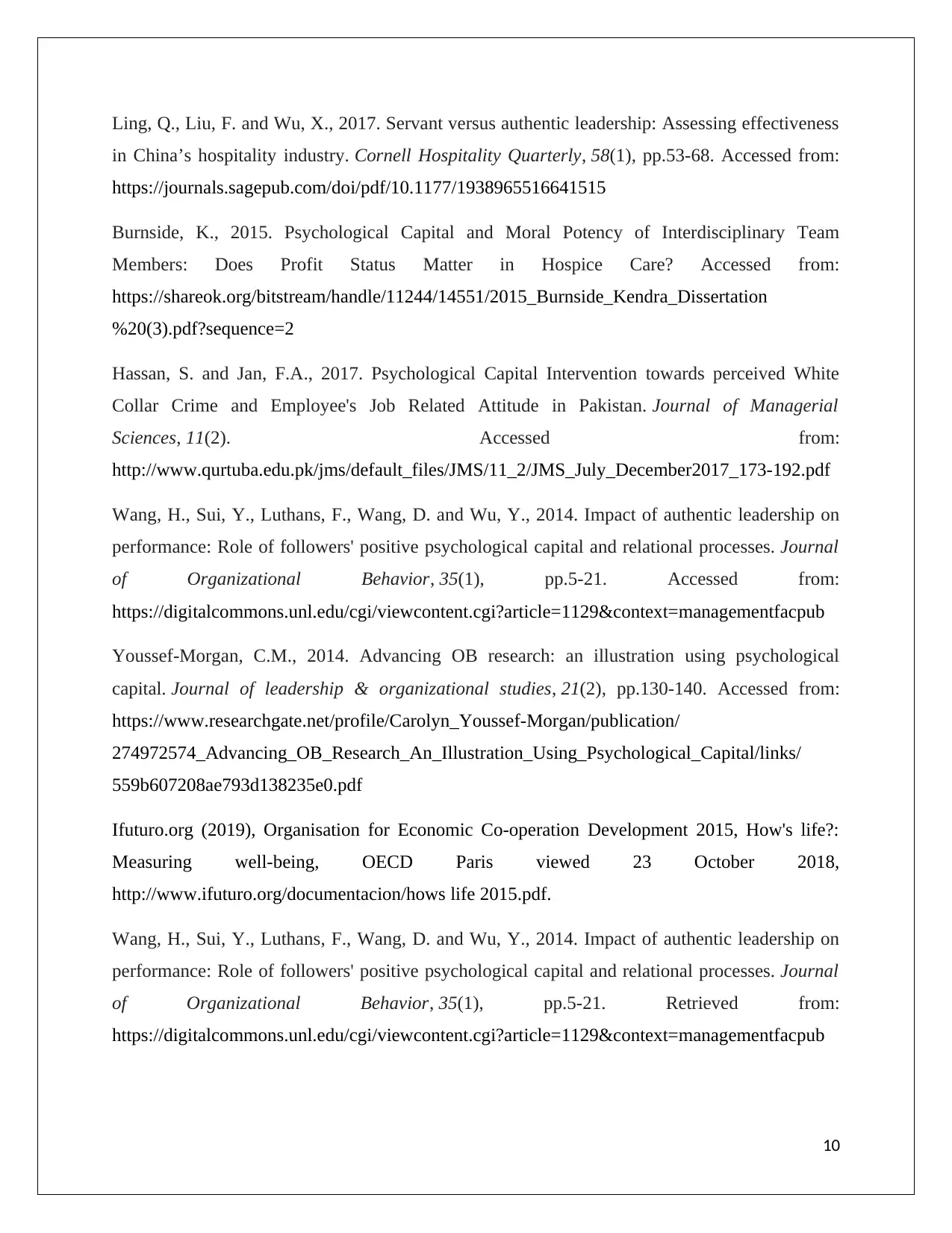
Ling, Q., Liu, F. and Wu, X., 2017. Servant versus authentic leadership: Assessing effectiveness
in China’s hospitality industry. Cornell Hospitality Quarterly, 58(1), pp.53-68. Accessed from:
https://journals.sagepub.com/doi/pdf/10.1177/1938965516641515
Burnside, K., 2015. Psychological Capital and Moral Potency of Interdisciplinary Team
Members: Does Profit Status Matter in Hospice Care? Accessed from:
https://shareok.org/bitstream/handle/11244/14551/2015_Burnside_Kendra_Dissertation
%20(3).pdf?sequence=2
Hassan, S. and Jan, F.A., 2017. Psychological Capital Intervention towards perceived White
Collar Crime and Employee's Job Related Attitude in Pakistan. Journal of Managerial
Sciences, 11(2). Accessed from:
http://www.qurtuba.edu.pk/jms/default_files/JMS/11_2/JMS_July_December2017_173-192.pdf
Wang, H., Sui, Y., Luthans, F., Wang, D. and Wu, Y., 2014. Impact of authentic leadership on
performance: Role of followers' positive psychological capital and relational processes. Journal
of Organizational Behavior, 35(1), pp.5-21. Accessed from:
https://digitalcommons.unl.edu/cgi/viewcontent.cgi?article=1129&context=managementfacpub
Youssef-Morgan, C.M., 2014. Advancing OB research: an illustration using psychological
capital. Journal of leadership & organizational studies, 21(2), pp.130-140. Accessed from:
https://www.researchgate.net/profile/Carolyn_Youssef-Morgan/publication/
274972574_Advancing_OB_Research_An_Illustration_Using_Psychological_Capital/links/
559b607208ae793d138235e0.pdf
Ifuturo.org (2019), Organisation for Economic Co-operation Development 2015, How's life?:
Measuring well-being, OECD Paris viewed 23 October 2018,
http://www.ifuturo.org/documentacion/hows life 2015.pdf.
Wang, H., Sui, Y., Luthans, F., Wang, D. and Wu, Y., 2014. Impact of authentic leadership on
performance: Role of followers' positive psychological capital and relational processes. Journal
of Organizational Behavior, 35(1), pp.5-21. Retrieved from:
https://digitalcommons.unl.edu/cgi/viewcontent.cgi?article=1129&context=managementfacpub
10
in China’s hospitality industry. Cornell Hospitality Quarterly, 58(1), pp.53-68. Accessed from:
https://journals.sagepub.com/doi/pdf/10.1177/1938965516641515
Burnside, K., 2015. Psychological Capital and Moral Potency of Interdisciplinary Team
Members: Does Profit Status Matter in Hospice Care? Accessed from:
https://shareok.org/bitstream/handle/11244/14551/2015_Burnside_Kendra_Dissertation
%20(3).pdf?sequence=2
Hassan, S. and Jan, F.A., 2017. Psychological Capital Intervention towards perceived White
Collar Crime and Employee's Job Related Attitude in Pakistan. Journal of Managerial
Sciences, 11(2). Accessed from:
http://www.qurtuba.edu.pk/jms/default_files/JMS/11_2/JMS_July_December2017_173-192.pdf
Wang, H., Sui, Y., Luthans, F., Wang, D. and Wu, Y., 2014. Impact of authentic leadership on
performance: Role of followers' positive psychological capital and relational processes. Journal
of Organizational Behavior, 35(1), pp.5-21. Accessed from:
https://digitalcommons.unl.edu/cgi/viewcontent.cgi?article=1129&context=managementfacpub
Youssef-Morgan, C.M., 2014. Advancing OB research: an illustration using psychological
capital. Journal of leadership & organizational studies, 21(2), pp.130-140. Accessed from:
https://www.researchgate.net/profile/Carolyn_Youssef-Morgan/publication/
274972574_Advancing_OB_Research_An_Illustration_Using_Psychological_Capital/links/
559b607208ae793d138235e0.pdf
Ifuturo.org (2019), Organisation for Economic Co-operation Development 2015, How's life?:
Measuring well-being, OECD Paris viewed 23 October 2018,
http://www.ifuturo.org/documentacion/hows life 2015.pdf.
Wang, H., Sui, Y., Luthans, F., Wang, D. and Wu, Y., 2014. Impact of authentic leadership on
performance: Role of followers' positive psychological capital and relational processes. Journal
of Organizational Behavior, 35(1), pp.5-21. Retrieved from:
https://digitalcommons.unl.edu/cgi/viewcontent.cgi?article=1129&context=managementfacpub
10
Paraphrase This Document
Need a fresh take? Get an instant paraphrase of this document with our AI Paraphraser
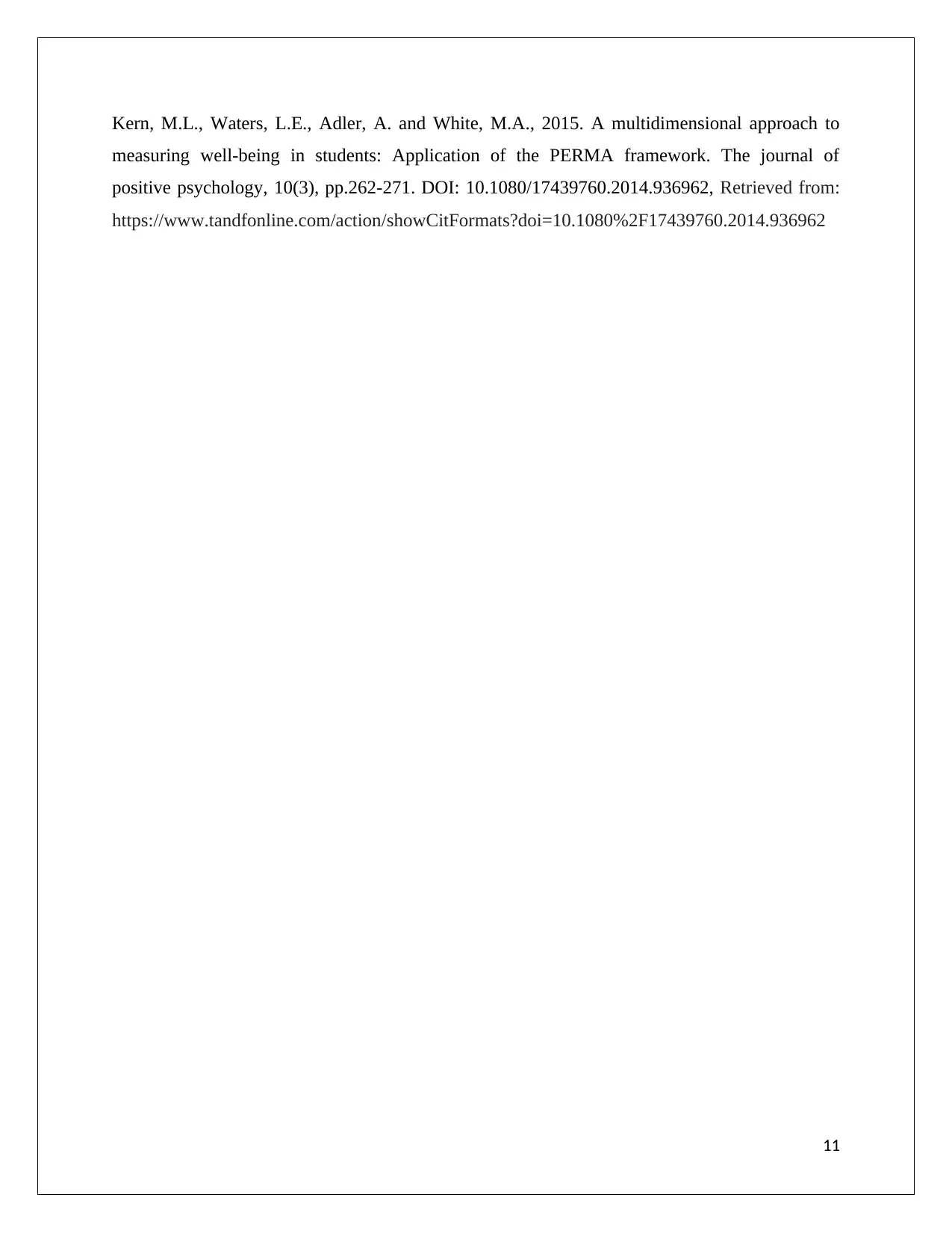
Kern, M.L., Waters, L.E., Adler, A. and White, M.A., 2015. A multidimensional approach to
measuring well-being in students: Application of the PERMA framework. The journal of
positive psychology, 10(3), pp.262-271. DOI: 10.1080/17439760.2014.936962, Retrieved from:
https://www.tandfonline.com/action/showCitFormats?doi=10.1080%2F17439760.2014.936962
11
measuring well-being in students: Application of the PERMA framework. The journal of
positive psychology, 10(3), pp.262-271. DOI: 10.1080/17439760.2014.936962, Retrieved from:
https://www.tandfonline.com/action/showCitFormats?doi=10.1080%2F17439760.2014.936962
11
1 out of 11
Related Documents
Your All-in-One AI-Powered Toolkit for Academic Success.
+13062052269
info@desklib.com
Available 24*7 on WhatsApp / Email
![[object Object]](/_next/static/media/star-bottom.7253800d.svg)
Unlock your academic potential
Copyright © 2020–2026 A2Z Services. All Rights Reserved. Developed and managed by ZUCOL.



